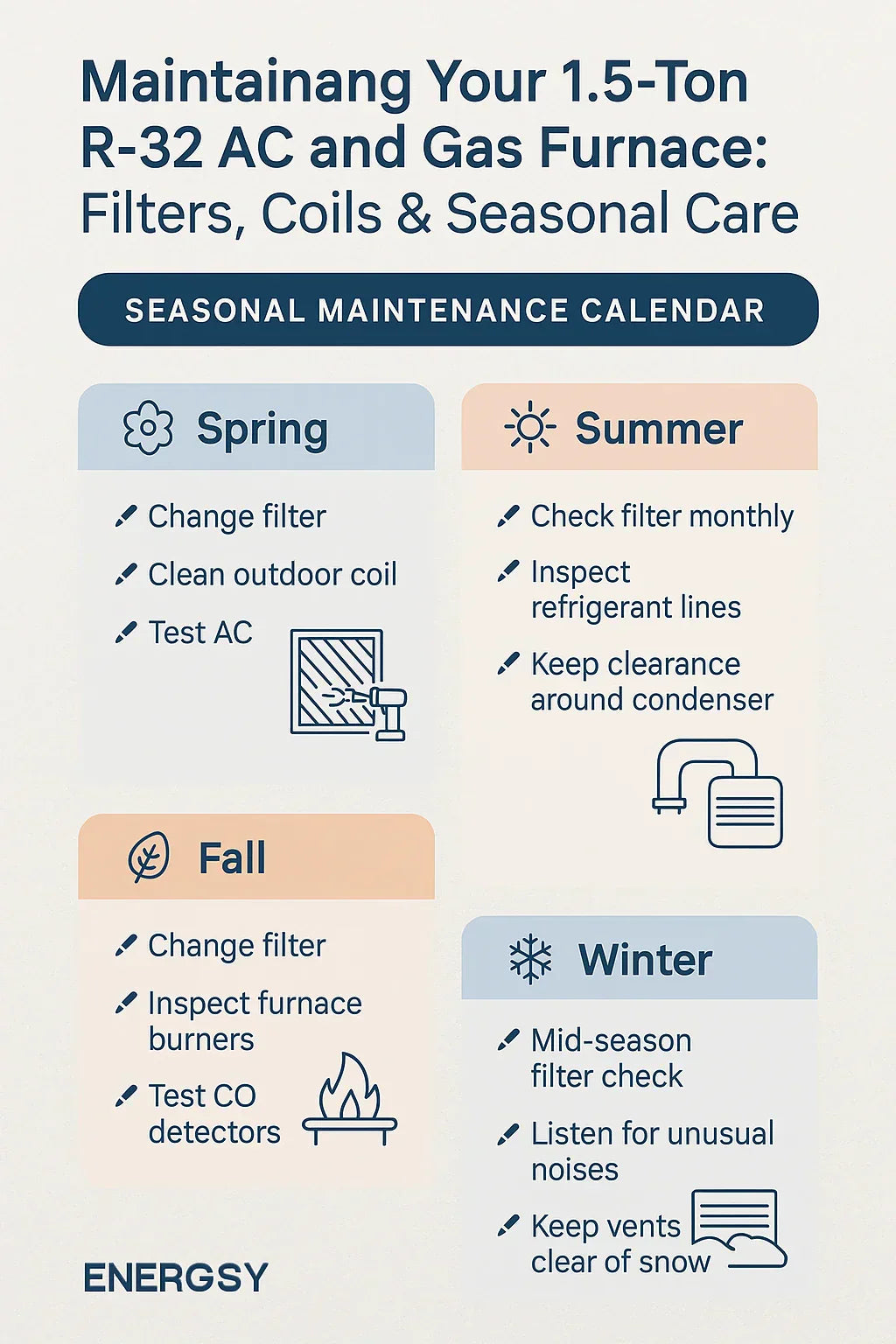🏠 Why Maintenance Matters for R-32 Systems
I’ll be honest — before I upgraded to my 1.5-ton R-32 AC and gas furnace combo, I wasn’t exactly the most diligent about HVAC maintenance.
I’d change the filter… eventually. Maybe hose off the outdoor unit if it looked like it had survived a pollen apocalypse.
But after investing nearly $9,000 into a new system, I realized:
If I wanted the 15.2 SEER2 efficiency and 96% AFUE performance to last, I had to take maintenance seriously.
Best 1.5 Ton AC and Gas Furnaces
Here’s why keeping your R-32 system maintained is non-negotiable:
-
Efficiency retention — Dirt and airflow restrictions can drop your SEER2 rating fast.
-
Fewer breakdowns — A $10 filter change beats a $400 service call.
-
Warranty protection — Most manufacturers require proof of annual maintenance.
📎 ENERGY STAR — HVAC Maintenance Tips
🧽 Filters — Your First Line of Defense
Your system’s filter isn’t just about cleaner air — it’s the easiest way to protect the blower motor, evaporator coil, and heat exchanger from dust buildup.
🧾 Choosing the Right Filter
Filters are rated by MERV (Minimum Efficiency Reporting Value):
-
MERV 1–4: Basic dust control — not enough for most homes.
-
MERV 8–11: Good balance of filtration and airflow — my choice.
-
MERV 13+: Hospital-grade filtration, but may restrict airflow in some systems.
⏳ How Often to Change It
-
Every 1–2 months in summer & winter if running daily
-
Every 3 months in mild seasons
-
More often if you have pets, allergies, or dusty surroundings
🚫 Signs of a Clogged Filter
-
Weak airflow from vents
-
Furnace or AC short-cycling
-
Visible dust on the filter surface
-
Rising energy bills without a comfort change
Jake’s tip: I buy a year’s worth of MERV 8 pleated filters in bulk and label each with the change month — no excuses.
❄ Cleaning the AC Coils
Coils are the heat exchange surfaces of your system — if they’re dirty, your R-32 refrigerant can’t work efficiently.
📦 Evaporator Coil (Indoor)
Purpose: Absorbs heat from your home’s air during cooling mode.
Steps (for homeowners):
-
Turn off power at the breaker.
-
Remove access panel above furnace.
-
Visually inspect for dust or mold.
-
Use a soft brush or no-rinse coil cleaner.
-
Replace panel and restore power.
📎 EPA — Indoor Coil Maintenance
🌳 Condenser Coil (Outdoor)
Purpose: Releases heat outdoors during cooling.
Steps:
-
Shut off unit at the disconnect.
-
Remove leaves, grass, and debris from fins.
-
Spray from inside out with garden hose (low pressure).
-
Use coil cleaner if needed — rinse thoroughly.
-
Straighten bent fins with a fin comb.
Jake’s warning: Don’t use high-pressure washers — you can crush the delicate aluminum fins.
🌀 Blower & Fan Maintenance
🔄 Blower Wheel (Indoor)
A dirty blower wheel = less airflow and higher utility bills.
During your annual tune-up, a tech should:
-
Remove blower assembly
-
Clean wheel blades
-
Check balance and motor bearings
🌬 Condenser Fan (Outdoor)
-
Inspect fan blades for dirt and damage
-
Tighten loose mounting bolts
-
Check motor amperage against spec
📎 HVAC.com — Fan Maintenance Tips
🌡 Furnace-Specific Seasonal Care
🔥 Burner Inspection
-
Look for rust or soot buildup
-
Ensure flame is steady and blue (yellow tips = incomplete combustion)
🏗 Heat Exchanger Check
-
Inspect for cracks (can leak carbon monoxide)
-
Only a licensed tech should perform this
🛠 Gas Line Leak Check
-
Soap solution or electronic leak detector
-
Gas valve should operate smoothly
💧 Condensate Drain Maintenance
High-efficiency furnaces produce condensate — keep the drain clear:
-
Flush with vinegar solution twice a year
-
Check for kinks or clogs in tubing
📎 Energy.gov — Gas Furnace Maintenance
📆 Seasonal Maintenance Calendar
🌸 Spring
-
Change filter
-
Clean outdoor coil
-
Test AC in mild weather to catch issues early
☀ Summer
-
Check filter monthly
-
Inspect refrigerant lines for insulation damage
-
Keep 2–3 feet clearance around condenser
🍂 Fall
-
Change filter
-
Inspect furnace burners
-
Test CO detectors
❄ Winter
-
Mid-season filter check
-
Listen for unusual furnace noises
-
Keep intake/exhaust vents clear of snow
🔧 When to Call a Pro
R-32 Refrigerant Handling
Because R-32 is an A2L refrigerant, charging, recovering, or leak repairs require EPA-certified techs trained in A2L safety.
📎 EPA Section 608 Certification Info
Annual Professional Tune-Up Checklist
-
Static pressure measurement
-
Refrigerant charge verification
-
Combustion analysis for furnace
-
Electrical connection tightening
-
Safety control testing
📉 Common Maintenance Mistakes to Avoid
-
Using too high MERV filter and choking airflow
-
Blasting condenser coil with high PSI water
-
Ignoring condensate drain until it floods
-
Storing items too close to furnace or outdoor unit
✅ Jake’s Maintenance Kit
What I keep on hand:
-
12 months of MERV 8 filters
-
No-rinse evaporator coil cleaner
-
Fin comb for condenser
-
Soft brush for dusting blower motor
-
Vinegar for condensate drain flushes
Bonus: I set calendar reminders for filter changes and seasonal coil checks.
📊 My Results After a Year of Proper Maintenance
-
Energy bills stayed consistent through peak summer
-
No service calls outside of annual tune-up
-
Furnace ran quietly all winter
-
Indoor humidity stayed in comfort range
In the next topic we will know more about: Single-Stage vs. Two-Stage in Small Systems: Which Should Jake Choose?







